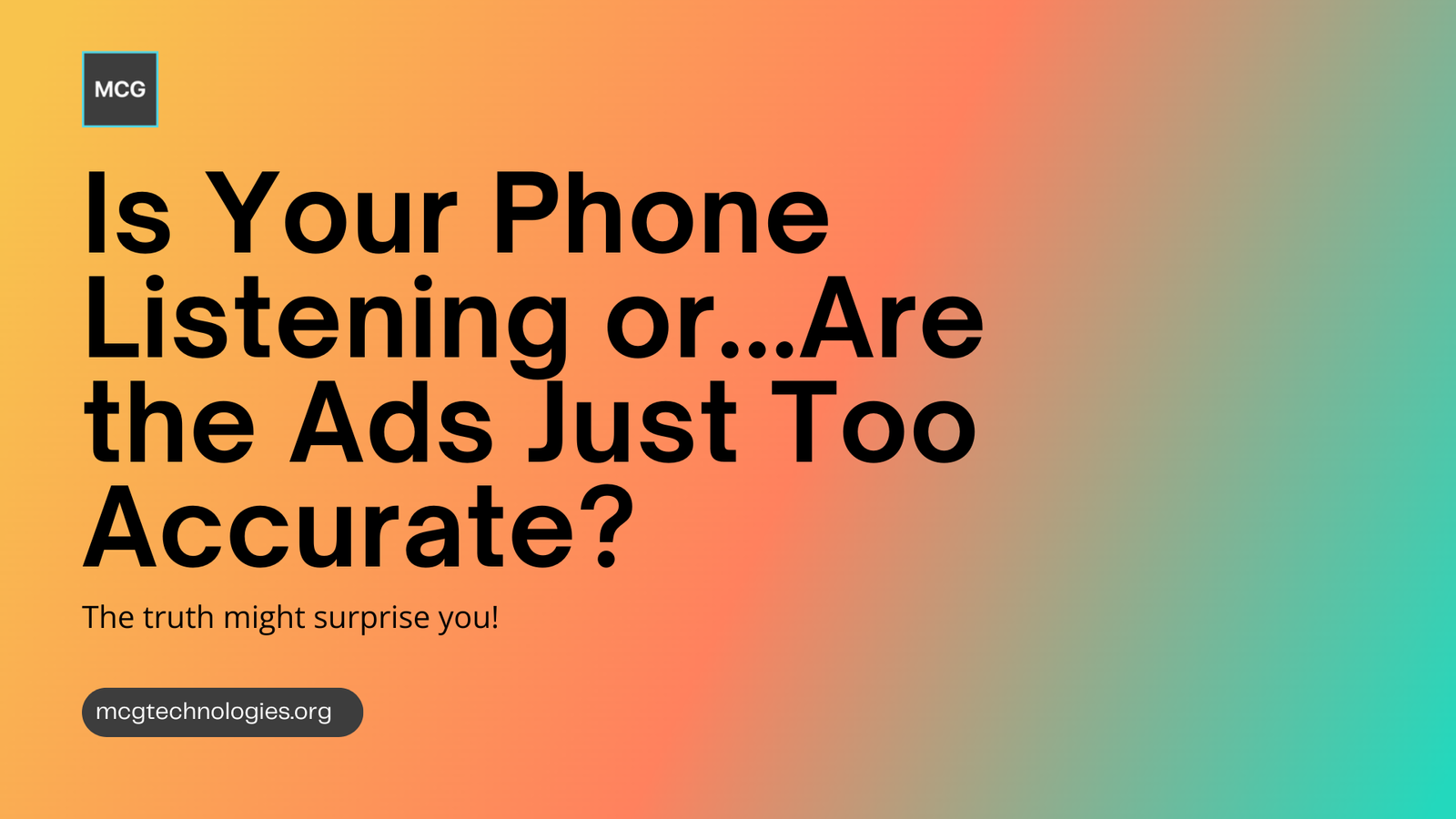Digital ads can feel almost psychic ever chatted about a product like sneakers or a vacation spot, and then seen an ad for it just minutes later? It’s enough to make anyone wonder: Is my phone actually listening to me?
This question has become one of today’s biggest digital privacy concerns. But is your phone really spying on you, or are AI-powered ad algorithms just that good at predicting your next move?
Let’s break it down.
Table of Contents
Is it a coincidence?
Many users report eerily specific ad experiences, such as:
- Talking about a product and seeing an ad soon after.
- Mentioning a hobby and getting targeted promotions.
- Visiting a store and later seeing its ad online.
It feels too perfect to be random but there’s more to the story.
The Truth: Does Your Phone Actually Listen?
Short answer: Probably not.
Tech leaders like Google, Meta (Facebook), and Apple have repeatedly denied using microphone data for ad targeting. Instead, they rely on powerful data collection and AI-driven prediction.
In reality, advertisers already know enough about you from your digital footprint that they don’t need to eavesdrop.
Digital Ads are more Clever than you think!
If your phone isn’t secretly recording your conversations, how do ads seem to read your mind? The answer lies in the massive amounts of data companies already collect about you. Here’s how they do it:

How Digital Ads Really Work And Why They Feel So Personal
Digital ads follow you everywhere. You see them on Google. You see them on Instagram. You see them on Facebook. Many people think their phones are listening to their private talks. Many people ask this question again and again. Do phones listen to you for advertising? The truth is both simple and surprising. Most of the time your phone does not record your voice for ads. Instead digital ads study your online behavior. They study your location. They study your purchase habits. They study your phone activity. This creates very accurate ad targeting.
This guide explains how digital ads know what you want. It explains why the ads feel so personal. It explains how to protect your digital privacy. And it explains the facts behind the question so many people ask. Do phones listen to you for advertising?
Your Search And Browsing History
Every search leaves a digital mark. When you type on Google the system saves that information. Every website you visit becomes a clue. Your YouTube watch history becomes data. Even if you never say a word your online actions build a strong pattern. Digital ads use these patterns to show you products and services.
This tracking does not need your voice. This is one reason why people still ask do phones listen to you for advertising. They think the accuracy comes from the microphone. But it comes from the huge amount of tracked data.
Location Tracking
Your phone knows your location. If you visit a coffee shop every day your phone logs it. When you stay there for twenty or thirty minutes every day advertisers understand your habits. Digital ads then show you coffee deals and cafe promotions.
This is another moment when people feel watched. It feels like the phone is hearing them. And again they ask do phones listen to you for advertising. But the ads come from location signals not from voice recording.
Purchase History And Loyalty Programs
Your purchase apps collect data. Your loyalty cards save information on every order. If you buy a watch this week you may see more watch ads later. Retailers sell this data to advertising and marketing team or agency platforms. Digital ads then target you with related items.
This also feels like your phone heard you say you want a new watch. It did not. Your purchase record spoke for you. Still many users think the phone is listening. And they continue to ask do phones listen to you for advertising.
Social Media Activity
Social media apps track everything. They track what you like. They track what you watch. They track what you comment on. They even track how long you stay on a post. This gives advertisers strong signals about your interests.
The system becomes so accurate that people believe there must be voice tracking. They ask again do phones listen to you for advertising. But the truth is simple. The algorithms study your actions not your audio.
Cross Device Tracking
If you search for hotel rooms on your laptop you may see travel ads on your phone. If you check flight prices on your tablet you may see the same digital ads on Instagram. This is possible because companies sync your data across all your devices.
This connected profile makes ads very smart. It also makes people think their phone heard their travel talk. And they ask the same question again. Do phones listen to you for advertising? But the actual cause is data syncing not voice spying.
Predictive Algorithms And Lookalike Audiences
Artificial intelligence studies millions of people at once. If people your age buy certain products the AI will guess you may also like the same things. Even if you never search for that item, digital ads still show it to you.
This predictive accuracy shocks people. It feels supernatural. Many people think the phone must be recording them. So the question comes back. Do phones listen to you for advertising? The real power comes from AI predictions not microphones.
What About Microphone Permissions
Some apps request microphone access. This is normal for voice assistants and video apps. But some apps have been found using these permissions in ways that can affect user trust. A study from Northeastern University in 2019 showed that a few apps captured small audio snippets for ad related analysis. This is rare. But even rare cases increase fear.
Even with this information the main system behind digital ads is still data tracking not voice tracking.
A Simple Test To Check If Your Phone Is Listening
People test this idea using simple experiments. You can do it too.
Pick a very uncommon item like a kiwi shaped teapot. Talk about it near your phone. Do not search for it. Do not type it. Wait two or three days. Look at your digital ads.
If you see related ads it is usually a coincidence. Or the system predicted your interest using your online behavior. This experiment shows that the accuracy of digital ads comes from data signals not voice signals.
How To Protect Your Privacy
You cannot stop all tracking. But you can control a part of it. Try these simple steps:
Turn off microphone access for apps that do not need it.
Use a VPN to hide your location.
Clear cookies often.
Use private browsing mode.
Limit how much time you spend on social media.
For stronger security use a professional service. MCG offers Managed Security Services. These services help detect risky apps. They help identify privacy leaks. They help protect your mobile data from hidden tracking behavior.
Are Phones Listening Or Are Ads Just Smart
Most evidence shows your phone is not actively recording your conversations for ads. Instead digital ads combine search history. They combine purchase history. They combine location data. They combine device activity. They combine social media actions. This creates extremely accurate predictions.
People ask again and again do phones listen to you for advertising. The real answer is that the system is not listening. The system is predicting. And the predictions feel so real that people start believing the microphone is involved.
The bigger problem is not audio surveillance. The bigger problem is the large amount of digital data people share without knowing.
FAQs About Digital Ads And Privacy
Can my phone record conversations without permission
Only if you give an app microphone access. Check your settings often and remove access from apps you do not trust.
Why are digital ads so accurate
Ad platforms use behavioral data. They use location data. They use cross device syncing. They use AI predictions. They do not need your audio.
Can I stop ad tracking completely
It is very hard to stop fully. But you can limit tracking by disabling ad personalization. You can use privacy based browsers like Brave. You can use tools like VPNs. You can reduce app permissions.




